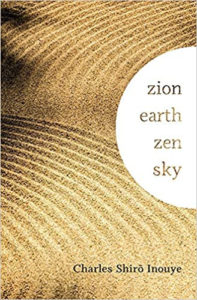Title: Zion Earth Zen Sky
Author: Charles Shirō Inouye
Publisher: Living Faith Book (Neal A. Maxwell Institute for Religious Scholarship), Brigham Young University, Provo, UT 84602
Genre: Autobiography
Year Published: 2021
Copyright: 2021
Number of Pages: 249
Binding: Soft Cover
ISBN13: 978-1-9503-0411-0
Price: 19.95
Reviewed by Conor Hilton for the Association for Mormon Letters
Little did I know when I first picked up Charles Shirō Inouye’s Zion Earth Zen Sky that his life had intersections with my own in tangential ways that occur off the page. About halfway through the memoir, Charles shares a story of a tragedy striking the Dukes, a family that he had been assigned to home teach. Kerry, the father, died suddenly of a heart attack, leaving behind his wife and four children. I was in the same primary class as the youngest kid, Kyle. I don’t remember anything about this, but my parents do. They know Charles and many of the other folks that color the pages in Zion Earth Zen Sky. Having shared a congregation with them years ago, before we left Arlington, Massachusetts, for the Mountain West.
This tangential closeness kept striking me as I read Charles’ words. I think it grounded Charles’ story and life in something and someone that I could touch. His writing aids in creating this sense of grounding and closeness. The life that Charles describes in these pages is a life committed, in ideals if not always in practice, to the daily maintenance of existence—‘raking’ as he terms it, drawing on the image, practice, and ideas of Zen gardens. I love this. A powerful image that I hope I can keep with me as I work to improve my own daily spiritual practice and commitment to the quotidian maintenance we all need to eventually know God.
I was struck throughout Zion Earth Zen Sky by the reality of the spiritual plane. Charles has miraculous experiences over and over again—safety from near death, inexplicable interventions, and even visitors from beyond the grave. For Charles, this is simply a part of the fabric of the universe, it has been woven into how he thinks about the world. I admire and envy the faith that Charles has that surrounds his interpretations of these experiences, and hope that I too can have that sort of humble, faithful engagement with creation.
In a section musing on justice and eternal progression, Charles says, “The end of the world is the Atonement, which started long ago. The end started at the very beginning.” This strikes me as a truth like one of the koans that Charles muses on throughout the book. I’m not sure exactly what it means, but I think pondering it is fruitful. I love the way that these sentences reframe the end of the world as synonymous with the Atonement since I at least have a fairly different emotional response to those two ideas. This sort of insightful wisdom is peppered throughout Charles’ book, alongside beautiful poetry and notes from the life of someone striving to continually turn their life to God.
I have never read a book from the Maxwell Institute quite like Zion Earth Zen Sky and hope that it may find its way into many readers’ hands. Folks with connections to Japan or Buddhism, people from immigrant families, and those looking for an inspiring, yet grounded model of discipleship will all find something of worth in these pages. I’ll be pondering them for years to come.

